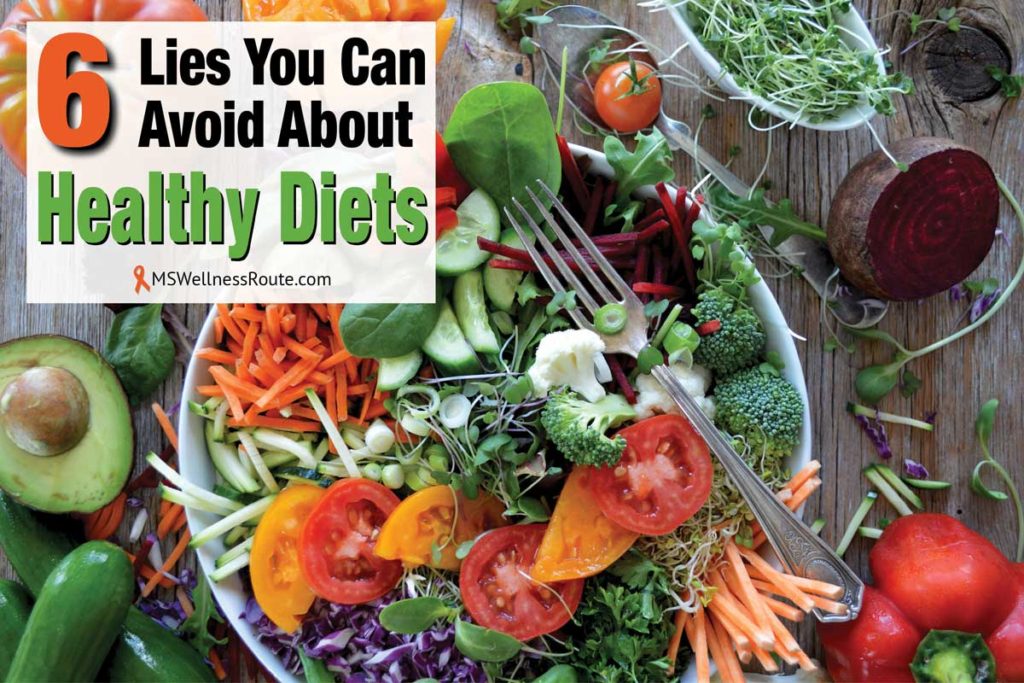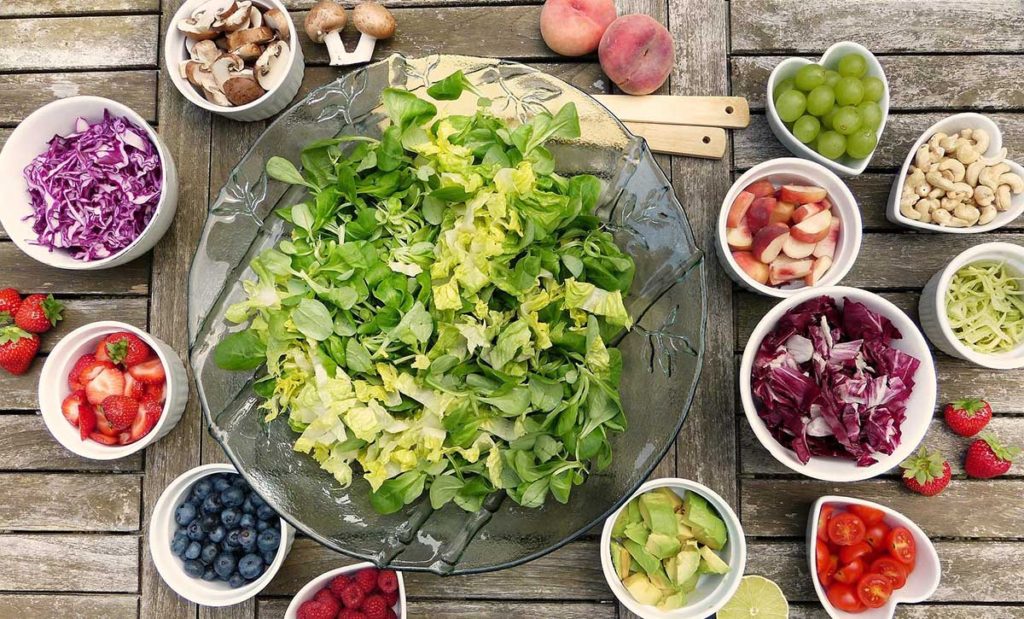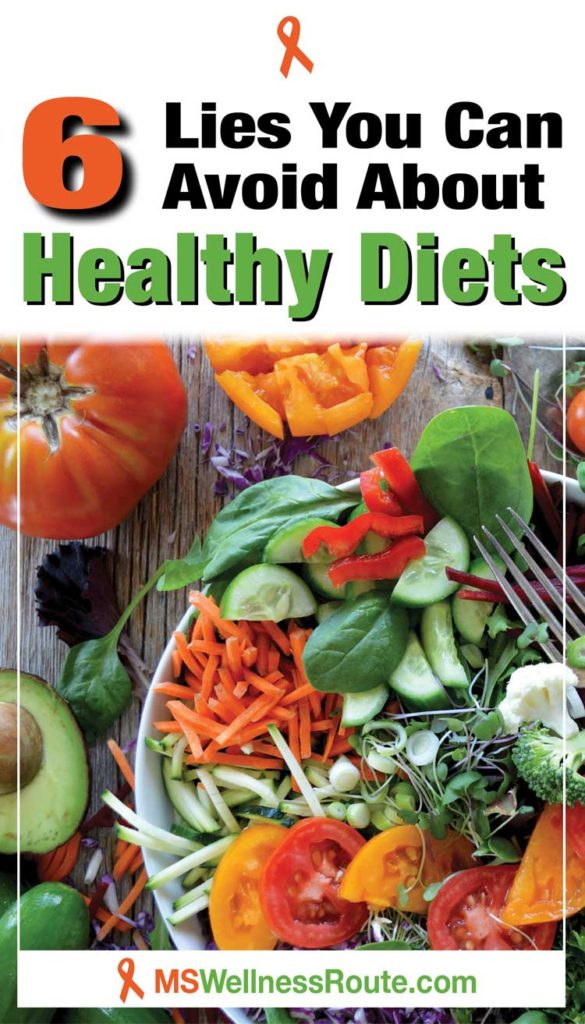Last Updated on November 16, 2023 by Cathy

Multiple sclerosis (MS) is a chronic inflammatory disease due to environmental factors. Such as infections, hormone imbalance, smoking, and eating a poor diet. There are many healthy diets for MS but not one is perfect.
Don’t fall into the trap that by changing your diet your MS will reverse within a few months. It may work for some but for most people, it takes a lot of hard work. Plus, the central nervous system is one of the slowest systems in the body to heal.
I did not say this to get you discouraged instead I said this to get you motivated. When you decide to change your lifestyle it will take a lot of determination. Yes, you will have some bad days but you will also have good days. MS is a horrible disease and if you don’t change your habits it will continue to ravish your body.
Here are six lies to avoid about healthy diets:

#1 – There Is One Perfect Diet for MS
There are many MS diets to choose from making it hard to choose which one to follow. I’ve been on several different MS diets looking for the one that will reverse all my symptoms.
And that diet is…
There isn’t one. There may be a perfect diet for some people but not for everyone. The Wahls Protocol is a very popular diet for MS and it has helped many people. When the book first came out I couldn’t wait to get started on it.
Since I was already following the Paleo diet I jumped right to level three. After one year of tracking what I ate and testing for ketones, all that happened was I lost too much weight. Yes, I was very disappointed. Then I realized, that the diet worked I just needed to remove my infections.
The key to a perfect diet is to alter the diet to fit YOUR needs.
Start by eating an anti-inflammatory diet then remove all foods your body is sensitive to. If you have any infections such as Candida lower your carbohydrates and take antifungals such as Solaray Yeast-Cleanse. If you have mycotoxins (mold) avoid foods with mold and take binders such as Integrative Therapeutics Activated Charcoal. If you are sensitive to histamines avoid leftovers and foods cooked at high temperatures.
As you can see one diet does not fit everyone’s needs.
#2 – High-Sugar or High Carb Diets Cause Candida

Candida is a yeast overgrowth that is common in people with MS. Yeast is a normal part of the digestive system. Normally the good bacteria keep Candida levels from overgrowing. However, certain circumstances cause Candida to overgrow throughout the body.
Many blogs claim a high sugar or high carbohydrate diets cause Candida. This is not true. Yes, they contribute to Candida AFTER you already have a yeast overgrowth but not before.
The likely culprit for causing yeast overgrowth is antibiotics. Antibiotics can save lives by killing deadly bacteria. They saved my son’s life from necrotizing fasciitis. You may know it as flesh-eating bacteria.
But, antibiotics not only kill the bad bacteria they kill the good bacteria as well. If you have been on many rounds of antibiotics you may have Candida overgrowth. Researchers discovered people with MS have more bad bacteria in their gut than good.
Studies show diets low in fiber and high in fats also contribute to yeast overgrowth (candida). Fiber feeds the good bacteria which most Americans don’t eat enough of. And, a high-fat diet results in major shifts in gut bacteria and gut fungal structures. This increases intestinal inflammation. Chronic inflammation causes MS.
Consuming foods to build back good bacteria will provide good gut health. That includes fermented foods, another myth buster. Studies show yeast found in fermented foods inhibits candida overgrowth.
Foods with probiotics will bring back a natural balance of gut flora. Eat LOTS of fruits and vegetables, they are full of fiber which feeds the good bacteria in your gut. If you are constipated eat more fruit such as apples, bananas, berries, cherries (don’t eat too many at once), kiwi, oranges, and pears.
“All disease begins in the gut.” – Hippocrates
#3 – I Get All The Nutrients I Need From A Nutrient-Dense Diet

Eating a nutrient-dense diet is key to good health. But what exactly does that mean?
If you follow an anti-inflammatory diet you will get all the nutrients your body needs. But, when you start removing foods due to food sensitives you are removing nutrients.
Using the Cronometer app is an easy way to track your nutrients to make sure you are getting enough. When I started using this app I noticed I was constantly low in vitamin E and magnesium. After adding in more foods with these nutrients my results are much better.
#4 – Follow the Food Pyramid
The United States Department of Agriculture (U.S.D.A.) taught generations of Americans to follow their food pyramid. They created it to offer guidelines on what a balanced diet should look like. But the original guide had carbohydrates as the largest group. – Remember, carbs feed infections like Candida.
Later they came out with an updated version but dairy and corn lobbyists had too much influence. Today they use “MyPlate” as a guideline for a balanced meal. Unfortunately, for people with MS, this still isn’t a good recommendation.
The reason is that they recommend one-quarter of your plate should be grains. Gluten is a grain and it causes a leaky gut. This is when the gut lining becomes damaged and the tight junctions open up. Researchers believe a leaky gut is where autoimmune disorders can occur.
#5 – Milk Is The Best Option For Calcium

The Dairy Association had several great campaigns. They made people believe dairy was the only source of calcium. Dairy is not the only source. Almonds, bok choy, canned sardines, kale, and salmon have more calcium than a glass of milk.
Having MS you should avoid all dairy products including whey (a milk protein). Studies found women who drank more milk had more MS flares. Countries that consume more dairy have higher rates of MS.
A recent study found, that in people with MS, the immune system thinks it’s attacking casein (a milk protein). But, it’s actually attacking a protein in myelin that is similar to casein. Myelin is the protective covering around nerves. As MS damages myelin it creates neurological disabilities.
#6 – Avoid All Fats
For decades we believed all fats caused heart disease. However, new studies found no association between total fat intake and heart disease risk. The American Heart Association still recommends avoiding all saturated fats.
Saturated fats come from animal sources such as red meat and poultry. They also come from plants such as coconut milk/oil and palm oil.
One study found that coconut milk/oil lowered LDL (bad) cholesterol. It also increases HDL (good) cholesterol. Medium-chain triglycerides (MCTs) are also healthy sources of saturated fats. MCTs have a neuroprotective and anti-inflammatory activity that benefits people with MS.
Granted you should avoid some fats. Such as trans fats and man-made fats like canola oil and margarine.
Quick Links To Information In This Post:
Six Lies You Can Avoid About Healthy Diets
There is a lot of misinformation when it comes to nutrition. Such as all saturated fats are bad, grains are good for everyone, and dairy is the best source of calcium. Plus, facts on nutrition are always changing due to new research. What was correct 30 years ago may not be correct today.
The easiest way to spot lies about healthy diets is to read credible and reliable sources and do your own research. Don’t fall for “my diet” is the only one that works – it isn’t true. There is no perfect diet that works for everyone.
The best thing you can do to avoid lies about healthy diets is…
First, start an anti-inflammatory diet, there are many studies with positive results.
Second, adjust the diet to fit your needs. Remove any foods that your body reacts badly to. Eat appropriately for any infections such as candida. Track your nutrients for one month and see if you are low on any. If so start eating more foods with those nutrients.
You can do it!

The Ultimate Guide to Surviving & Thriving with MS
Subscribe for free and you will receive The Ultimate Guide to Surviving & Thriving with MS. You will also receive a weekly newsletter with extra tips not shared on the blog.
Want to remember this health tip? Pin it to your Pinterest board!

Images by Jill Wellington, silviarita, and Skica911 from Pixabay and Laker from Pexels
Resources:
https://pubmed.ncbi.nlm.nih.gov/22109896/
https://www.ncbi.nlm.nih.gov/pmc/articles/PMC7711718/
https://www.ncbi.nlm.nih.gov/pmc/articles/PMC6723656/
6 Lies You Can Avoid About Healthy Diets





